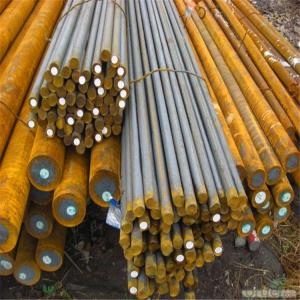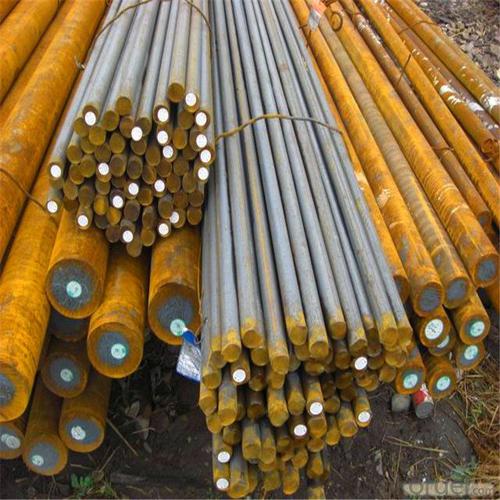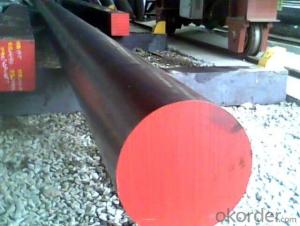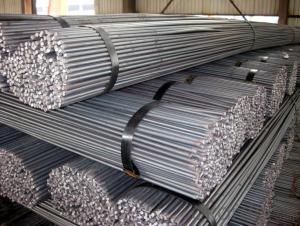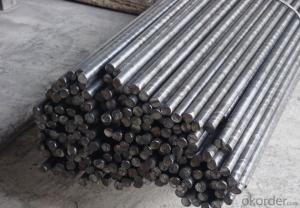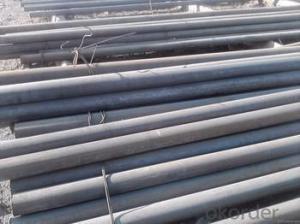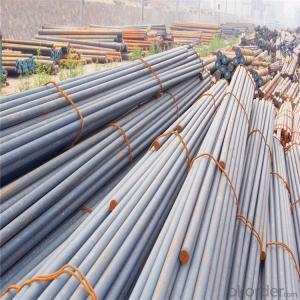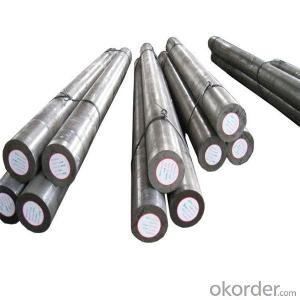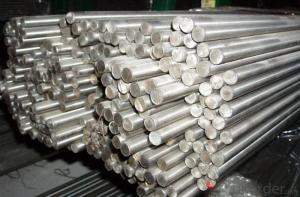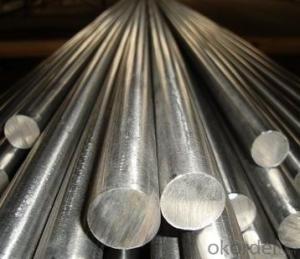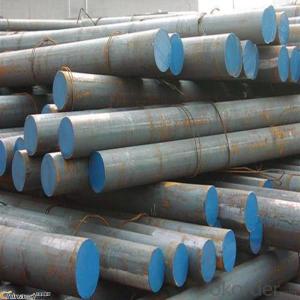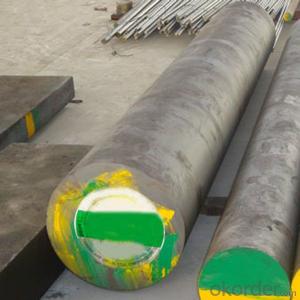17CrNiMo6 Hot-rolled Steel Round Bars Gear steel
- Loading Port:
- Tianjin
- Payment Terms:
- TT OR LC
- Min Order Qty:
- 100 m.t.
- Supply Capability:
- 50000 m.t./month
OKorder Service Pledge
OKorder Financial Service
You Might Also Like
Specification
17CrNiMo6 Hot-rolled Steel Round Bars Gear steel
Product Description of 17CrNiMo6 Hot-rolled Steel Round Bars Gear steel
1. Steel grade: 17CrNiMo6
2. Length: 6M-12M
3. Diameter: 16mm-300mm
4. Product range: round bar, flat bar, square bar
5. Technique: Hot rolled, forged, cold drawn
Specification of 17CrNiMo6 Hot-rolled Steel Round Bars Gear steel
Material | 17CrNiMo6 | Round bar | Dia(mm) | 16-300mm |
Process | EAF + LF + VD + Forged + Heat Treatment (optional) | Length (mm) | Max 12m | |
Heat treatment | Normalized / Annealed / Quenched / tempered | Flat bar | Thickness(mm) | 8-500mm |
Delivery condition | Hot forged +Rough machined (black surface after Q/T)+ Turned (optional) | Width(mm) | 70-200mm | |
Test | Ultrasonic test according to SEP 1921-84 D/d | Length (mm) | Max 12m |
Chemical Composition of 17CrNiMo6 Hot-rolled Steel Round Bars Gear steel
C | Si | Mn | Cr | Ni | Cu |
0.42~0.47 | 0.17~0.37 | 0.35~0.65 | ≤0.25 | ≤0.30 | ≤0.25 |
Photo Show of 17CrNiMo6 Hot-rolled Steel Round Bars Gear steel
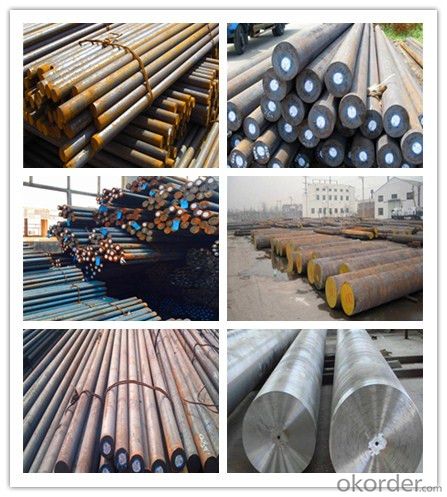
Packing and Delivery:
Packing in bundle package, or as customer's requirements.
Delivery Detail: 45 days after receiving the deposit.
Usage and Applications of 17CrNiMo6 Hot-rolled Steel Round Bars Gear steel
1. Steel round bar is used in a large number of architectural and engineering structures. Or it can be used in construction of plants for the production of steel house frames, high-voltage transmission towers, bridges, vehicles, boilers, containers, ships, etc.
2. And we can use this kind of product on the performance of the mechanical parts if the demand is not very high.
3. Some special material steel round bar can be used for main shaft of steamer, hummer shank, with big section and supper force.
Company Information
CNBM International Corporation is the most important trading platform of CNBM group.
Whith its advantages, CNBM International are mainly concentrate on Cement, Glass, Iron and Steel, Ceramics industries and devotes herself for supplying high qulity series of refractories as well as technical consultancies and logistics solutions.


F A Q
1, Your advantages?
professional products inquiry, products knowledge train (for agents), smooth goods delivery, excellent customer solution proposale
2, Test & Certificate?
SGS test is available, customer inspection before shipping is welcome, third party inspection is no problem
3, Factory or Trading Company?
CNBM is a trading company but we have so many protocol factories and CNBM works as a trading department of these factories. Also CNBM is the holding company of many factories.
4, Payment Terms?
30% TT as deposit and 70% before delivery.
Irrevocable L/C at sight.
5, Trading Terms?
EXW, FOB, CIF, FFR, CNF
6, After-sale Service?
CNBM provides the services and support you need for every step of our cooperation. We're the business partner you can trust.
For any problem, please kindly contact us at any your convenient time.
We'll reply you in our first priority within 24 hours.
- Q: What are the different international standards for steel round bars?
- There are several international standards that define the specifications and requirements for steel round bars. Some of the commonly used standards include: 1. ASTM A36/A36M: This standard covers carbon structural steel shapes, plates, and bars of structural quality for use in riveted, bolted, or welded construction of bridges and buildings. It specifies the chemical composition, mechanical properties, and dimensional tolerances for steel round bars. 2. ASTM A615/A615M: This standard specifies the requirements for deformed and plain carbon-steel bars for concrete reinforcement. It covers bars with sizes ranging from 6 to 60 mm in diameter and provides guidelines for chemical composition, mechanical properties, and bend tests. 3. BS 4449: This British Standard covers steel bars for the reinforcement of concrete. It outlines the requirements for carbon steel bars in various grades, including B500B and B500C. It specifies the tensile properties, chemical composition, and dimensional tolerances for these steel round bars. 4. DIN 17100: This German standard specifies the general structural steels, including steel round bars. It provides guidelines for the chemical composition, mechanical properties, and technical delivery conditions for different grades of steel bars. 5. JIS G3101: This Japanese Industrial Standard covers general structure rolled steel for various applications. It includes steel round bars and defines the chemical composition, mechanical properties, and dimensional tolerances for different grades of steel bars. 6. ISO 6935-2: This International Organization for Standardization standard specifies the requirements for hot-rolled steel bars for the reinforcement of concrete. It provides guidelines for the chemical composition, mechanical properties, and dimensional tolerances of steel round bars used in construction. These are just a few examples of the various international standards that exist for steel round bars. It is important to consult the appropriate standard based on the specific application and requirements to ensure compliance and quality of the steel round bars used.
- Q: How do you prevent rust on steel round bars?
- There are various effective methods available to prevent rust on steel round bars. Here are some strategies you can utilize: 1. Employ a protective coating: An effective way to prevent rust is by applying a protective coating such as paint, varnish, or enamel. These coatings act as a barrier, preventing moisture and oxygen from reaching the steel surface and causing rust. 2. Opt for galvanization: Galvanizing steel round bars involves coating them with a layer of zinc. This process creates a protective barrier, as the zinc acts as a sacrificial anode, corroding instead of the steel. Galvanized steel is highly resistant to rust and is commonly used in outdoor applications. 3. Utilize powder coating: Powder coating is another effective method of preventing rust on steel round bars. In this process, a dry powder is electrostatically applied to the steel surface, which is then cured under heat. The resulting coating provides excellent protection against rust and corrosion. 4. Maintain regular cleaning and maintenance: To prevent rust, it is important to regularly clean your steel round bars and remove any dirt, moisture, or other corrosive substances. Additionally, applying a rust inhibitor or lubricant can further protect the steel from corrosion. 5. Ensure proper storage: Proper storage of steel round bars is crucial in reducing the risk of rust. It is advisable to store them in a dry and well-ventilated area, avoiding direct contact with the ground or moisture-prone areas. Using pallets or racks to keep the steel elevated and properly spaced can also help prevent rust formation. 6. Avoid exposure to harsh environments: Exposing steel round bars to harsh environments, such as saltwater or acidic chemicals, significantly increases the risk of rust. If feasible, it is recommended to protect the steel from prolonged exposure to these substances or consider using a more corrosion-resistant material in such conditions. By implementing these preventive measures, you can effectively minimize the likelihood of rust formation on steel round bars, ensuring their durability and preserving their structural integrity.
- Q: Grade 1 steel is round steel, grade two steel is ribbed thread steel. Are the weight of the two units the same?
- Grade two steel is ribbed steel, but the average diameter is calculated. The chemical composition of grade steel and grade two steel is different, but the density of them is the same. Therefore, the unit weight of grade 1 steel and grade two steel is the same.
- Q: Can steel round bars be used in the production of forgings?
- In the production of forgings, steel round bars can be utilized. These round bars are commonly employed as the primary materials in forging procedures. To shape them, the round bars are heated to a specific temperature and then subjected to diverse forging techniques like hammering, pressing, or rolling. Through the application of heat and pressure during the forging process, the mechanical properties of the steel are improved, rendering it stronger and more enduring. Steel round bars are highly suitable for forging production as they ensure a consistent and uniform shape, guaranteeing that the final product adheres to the required specifications. Furthermore, steel round bars offer versatility in terms of their size, grade, and composition, allowing for a wide range of applications across various industries such as automotive, aerospace, and construction.
- Q: What are the advantages of using chromium-vanadium alloy steel round bars?
- Using chromium-vanadium alloy steel round bars has several advantages: 1. Exceptional Strength and Hardness: Chromium-vanadium alloy steel is renowned for its high strength and hardness. It possesses a strong tensile strength, making it ideal for heavy-duty applications and resistance against wear and tear. 2. Enhanced Durability: The incorporation of chromium and vanadium elements improves the durability of the alloy steel round bars. It offers excellent resistance to corrosion, oxidation, and high temperatures, making it perfect for harsh environments. 3. Versatility in Applications: Chromium-vanadium alloy steel round bars provide versatility in various applications. They are suitable for manufacturing tools, springs, gears, and other components requiring strength and durability. This alloy steel's versatility makes it highly favored in industries like automotive, aerospace, and construction. 4. Convenient Machinability: Chromium-vanadium alloy steel is relatively easy to machine and work with, offering convenience to manufacturers. It can be easily shaped, cut, and formed into desired sizes and shapes without compromising its mechanical properties. 5. Cost-Effective Option: Despite its exceptional properties, chromium-vanadium alloy steel round bars tend to be cost-effective when compared to other high-performance alloys. Hence, it is a popular choice for industries that require strong and durable materials within their budget. 6. Exceptional Fatigue Resistance: Chromium-vanadium alloy steel demonstrates exceptional fatigue resistance, making it suitable for applications involving repetitive stress or cyclic loading. It can withstand repeated use and maintain its structural integrity over an extended period. In conclusion, chromium-vanadium alloy steel round bars offer a combination of high strength, enhanced durability, versatility, and cost-effectiveness. These advantages make it the preferred material choice for various industrial applications where reliability and performance are of utmost importance.
- Q: How are steel round bars manufactured?
- Steel round bars are typically manufactured through a process known as hot rolling, where a large steel billet is heated and passed through a series of rollers which gradually shape and size it into a round bar. This process ensures the bar's uniformity, strength, and durability, making it suitable for various applications in industries such as construction, manufacturing, and engineering.
- Q: What are the advantages of using nickel-chromium alloy steel round bars?
- Using nickel-chromium alloy steel round bars in various applications offers several benefits. Firstly, these round bars possess outstanding corrosion resistance properties. The inclusion of nickel and chromium elements in the alloy enhances its ability to withstand corrosion from moisture, chemicals, and oxidation, making it suitable for use in challenging environments like marine applications, chemical processing plants, and oil refineries. Secondly, these round bars exhibit high temperature resistance. The combination of nickel and chromium in the alloy allows it to endure elevated temperatures without compromising its structural integrity. This makes them ideal for use in heat exchangers, furnaces, and other high-temperature applications. Furthermore, these round bars boast exceptional mechanical properties. They demonstrate excellent strength, toughness, and wear resistance, making them ideal for applications that require high load-bearing capabilities. Additionally, they exhibit good ductility, enabling easy machining and fabrication. Additionally, these round bars possess good electrical conductivity, making them suitable for electrical and electronic applications where conductivity is crucial, such as in the manufacturing of resistors, heating elements, and electrical connectors. Lastly, these round bars are readily available and cost-effective. Being a widely used material in various industries, they are easily accessible and can be obtained at competitive prices. In conclusion, the advantages of utilizing nickel-chromium alloy steel round bars encompass excellent corrosion resistance, high-temperature resistance, superior mechanical properties, good electrical conductivity, and cost-effectiveness. These characteristics make them the preferred choice for a wide range of applications in industries such as construction, automotive, aerospace, and electrical engineering.
- Q: What are the different safety considerations when working with steel round bars?
- When working with steel round bars, there are several safety considerations to keep in mind. First and foremost, it is important to wear appropriate personal protective equipment (PPE) such as safety glasses, gloves, and steel-toed boots to protect against potential hazards. Additionally, one should always handle the steel bars with care to avoid injuries from sharp edges or heavy lifting. It is crucial to ensure a secure and stable work area to prevent slips, trips, and falls. Furthermore, when using tools or machinery to cut or shape the steel bars, proper training and caution should be exercised to prevent accidents and follow all recommended safety procedures.
- Q: What are the different types of steel round bar alloys for improved corrosion resistance?
- There are several different types of steel round bar alloys that offer improved corrosion resistance. Some common examples include stainless steel alloys such as 304, 316, and 410, which contain chromium and nickel to create a protective layer against corrosion. Additionally, weathering steel alloys like ASTM A588 and A709 are known for their ability to develop a rust-like appearance that acts as a protective barrier. Other options include duplex stainless steels, which combine the benefits of austenitic and ferritic alloys, and high-alloy steels like Inconel and Hastelloy, which are highly resistant to corrosion in extreme environments.
- Q: Can steel round bars be used for tooling applications?
- Yes, steel round bars can be used for tooling applications. Steel round bars are often chosen for tooling applications due to their high strength, durability, and ability to withstand heavy loads and wear. They can be machined, shaped, and heat-treated to meet specific tooling requirements, making them versatile and suitable for various tooling applications.
Send your message to us
17CrNiMo6 Hot-rolled Steel Round Bars Gear steel
- Loading Port:
- Tianjin
- Payment Terms:
- TT OR LC
- Min Order Qty:
- 100 m.t.
- Supply Capability:
- 50000 m.t./month
OKorder Service Pledge
OKorder Financial Service
Similar products
Hot products
Hot Searches
Related keywords
